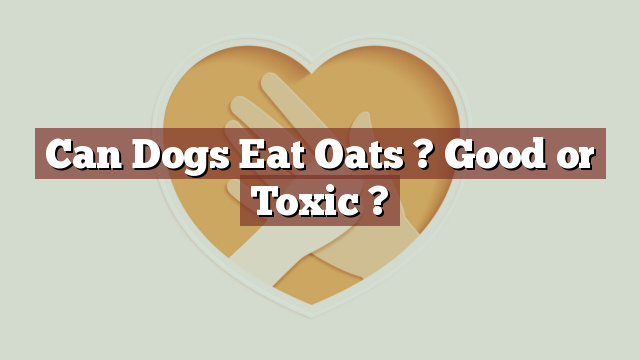Can Dogs Eat Oats? Good or Toxic?
When it comes to our furry companions, it is crucial to be aware of what foods are safe for them to consume. Oats, a popular breakfast staple for humans, may seem like a healthy option to share with our dogs. However, it is essential to understand if oats are suitable for our canine friends. In this article, we will explore the nutritional value of oats, consider their safety for dogs, and discuss potential risks or benefits of including oats in their diet.
Nutritional Value of Oats: Fibrous, Protein-rich, and Packed with Essential Nutrients
Oats are known for being a highly nutritious grain. They are loaded with fiber, which promotes healthy digestion in dogs, just as it does in humans. Additionally, oats contain a significant amount of protein, making them a decent source of this essential nutrient for our four-legged friends. Oats are also rich in vitamins and minerals, including iron, zinc, and B vitamins, which contribute to overall canine health.
Can Dogs Eat Oats? Safety Considerations and Expert Opinions
Can dogs eat oats? Yes, dogs can safely consume oats in moderate amounts. According to veterinary experts, oats are not toxic to dogs and can be included in their diet. However, it is crucial to prepare oats in a way that is safe for dogs. Avoid adding sugar, salt, or any artificial sweeteners, as these can be harmful to dogs. Additionally, ensure that the oats are cooked thoroughly to avoid any issues with digestion.
Potential Risks or Benefits of Dogs Consuming Oats: Digestive Health, Weight Management, and More
Feeding your dog oats can bring several potential benefits, especially when included as part of a balanced diet. The fiber content in oats can aid in maintaining healthy bowel movements and preventing constipation in dogs. Oats can also contribute to weight management, as they provide a feeling of fullness and can help regulate blood sugar levels.
However, it is essential to note that while oats are generally safe for dogs, some canines may have specific dietary restrictions or allergies. As with any new food introduced to your dog’s diet, it is important to observe any adverse reactions that may occur and consult with a veterinarian if necessary.
What to Do if Your Dog Eats Oats: Monitoring, Moderation, and Consulting a Vet
If your dog consumes oats, there is usually no need to panic. However, it is recommended to monitor your dog for any unusual behavior or digestive issues. If your dog experiences vomiting, diarrhea, or any other concerning symptoms after consuming oats, it is wise to contact your veterinarian for guidance and advice.
As with any new addition to your dog’s diet, moderation is key. Start by introducing small amounts of oats to ensure that your dog tolerates them well. Gradually increase the quantity over time if there are no adverse reactions.
Conclusion: Oats Can Be a Healthy Addition to a Dog’s Diet, but with Caution and Moderation
In conclusion, oats can be a healthy addition to your dog’s diet due to their fibrous and nutrient-rich composition. They can contribute to good digestive health and weight management. However, it is important to feed oats to dogs in moderation and ensure they are prepared in a manner that is safe for their consumption. Remember to monitor your dog’s reaction and consult a veterinarian if any concerns arise. With caution and moderation, oats can indeed be a wholesome inclusion in your furry friend’s diet.
Thank you for investing your time in exploring [page_title] on Can-Eat.org. Our goal is to provide readers like you with thorough and reliable information about various dietary topics. Each article, including [page_title], stems from diligent research and a passion for understanding the nuances of our food choices. We believe that knowledge is a vital step towards making informed and healthy decisions. However, while "[page_title]" sheds light on its specific topic, it's crucial to remember that everyone's body reacts differently to foods and dietary changes. What might be beneficial for one person could have different effects on another. Before you consider integrating suggestions or insights from "[page_title]" into your diet, it's always wise to consult with a nutritionist or healthcare professional. Their specialized knowledge ensures that you're making choices best suited to your individual health needs. As you navigate [page_title], be mindful of potential allergies, intolerances, or unique dietary requirements you may have. No singular article can capture the vast diversity of human health, and individualized guidance is invaluable. The content provided in [page_title] serves as a general guide. It is not, by any means, a substitute for personalized medical or nutritional advice. Your health should always be the top priority, and professional guidance is the best path forward. In your journey towards a balanced and nutritious lifestyle, we hope that [page_title] serves as a helpful stepping stone. Remember, informed decisions lead to healthier outcomes. Thank you for trusting Can-Eat.org. Continue exploring, learning, and prioritizing your health. Cheers to a well-informed and healthier future!

